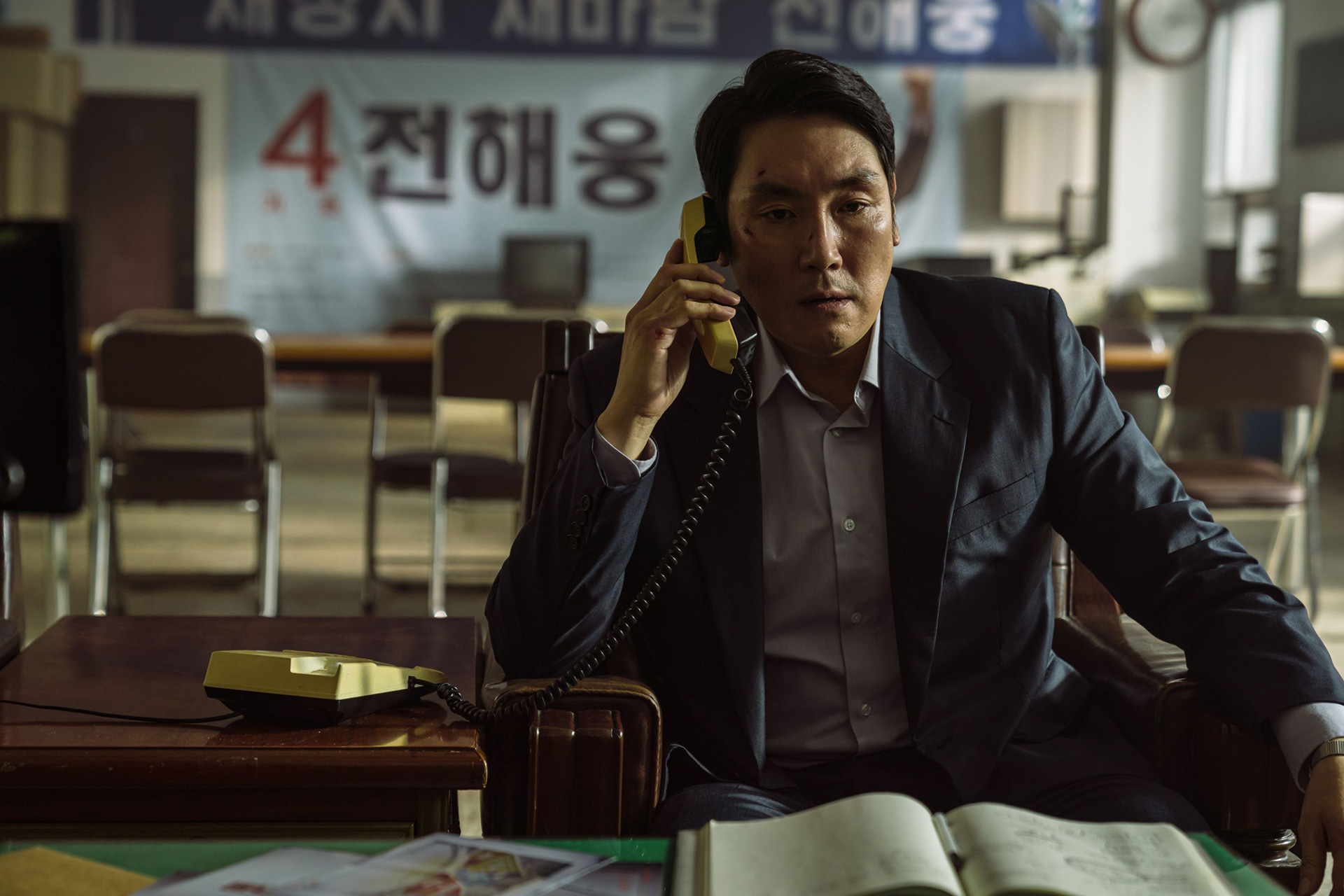There’s no way anybody beats Jeon Hae-woong (Cho Jin-woong) in a hometown election—everyone loves him. Walking down the street means shaking hands and bowing to applause when the people know he’ll fight for them. He is one of them, after all. Thinking as much only proves naïve if the world in which he exists is corrupt and, per the President—also up for re-election—this will be the most transparently legal ballot box since Korea became democratized. He’s therefore a shoo-in upon earning the Democratic party’s nomination. And that’s in the bag, considering his political mentor Kwon Soon-tae (Lee Sung-min) operates as puppet-master for all of Busan’s interests within the capital. Jeon’s victory awaits.
Except, of course, it doesn’t. If you believe it when any politician (especially one at-risk of losing power if the regional elections don’t also swing left) says voting is safer than ever, I’ve got some ocean-front property in Kansas to sell you. Director Lee Won-tae and writer Lee Su-jin understand this all too well and thus ensure that Jeon’s aspirations are dashed at the last second. Why? He dared live up to his scruples. He said he’d fight for the people, then backed it up by hitting the streets to tell everyone never to sell their harbor property because the corporations buying were all in the pocket of corrupt bureaucrats looking to line their own pockets. And Kwon epitomizes that very cutthroat sort.
His shadowy figure’s reach is so vast that it might ring over-the-top to anyone who hasn’t paid attention to politics for the last fifty years. The Devil’s Deal goes so far as to open with a disclaimer ensuring audiences that everything is fiction, lest foreigners believe Korea in the ’90s was this bad—though needing to say anything of the sort proves it was. The second Jeon puts Kwon’s payday in jeopardy, an impromptu meeting is organized to quickly replace him with someone else who’s willing to run straight past “loyal” to “lapdog” territory. It’s a betrayal Jeon refuses to take sitting down, so he makes some calls to run anyway before ultimately regaining his lead.
This is but step number one of an expansive list that should see Jeon making a televised victory speech. As is often the case, however, being the smartest person in the room hardly guarantees anything but disappointment when money can prevail by moving immovable mountains. Kwon has bottomless pockets. Jeon has a so-called “hooligan” (Mu-Yeol Kim’s Kim Pil-do) as an associate; being unbeatable in Haeundae means having friends of all walks of life. With some light espionage to steal confidential zoning plans and a couple huge promises to Pil-do and another gangster, Jung, where shoreline construction permits are concerned, our determined independent candidate fills his coffers with millions to blanket the district with advertisements and grease every palm reaching for a bribe. “Fair” is officially dead.
And why shouldn’t it be? It’s not like Jeon rigged this thing first. He’s simply fighting fire with fire. Unfortunately for him, Kwon’s wallet realigns the scale to his favor every time Jeon’s shrewd maneuvers win an advantage. And if he can’t get even footing in the corruption game, what’s left but seeking balance through more violent means? To think that this uncertain hopeful practicing his message in front of a mirror before his wife hands him an envelope of cash with the words “This is for food, not booze” could ever have the stomach to go toe-to-toe with Kwon is impossible. Yet here he is, rising to the occasion after each increasingly more damning obstacle. How long before his quest for justice inevitably turns towards revenge?
Should that sound intense, it is. Give credit to all involved, though: it’s also quite funny. Not in a way that would label The Devil’s Deal a comedy per se, but the situational humor of an honest man perpetually going through the wringer because he dared stand up to the big boys is undeniable. Think the tone of a Scorsese film à la The Wolf of Wall Street or Goodfellas, where writing and acting fire on a level of pure entertainment. Cho Jin-woong becomes the perfect anti-hero as a result: a guy we like so much at the start that we’ll do anything to continue rooting even as Lee pushes him further and further into a darkened corner of dog-eat-dog survivalism.
It helps that the great supporting cast supplies him everything he needs to do so. You have the young reporter (Yeo-Eun Son’s Sang) willing to blow-up her career if needed to highlight true corruption while her bosses take their pay day. There’s Pil-do walking the line between friend and foe depending on how his investment in Jeon looks any given day; Jung’s crazed psychopath who’s too moronic to see that his willingness to put events in motion that hurt his enemies places him in worse crosshairs; and Kwon’s calculating stoicism to place him three steps ahead at every turn. And the latter is made only more intriguing by his genuine appreciation for Jeon. He likes the guy a lot (more as things devolve). He just likes power more.
The question ultimately becomes about leverage once the other pieces on Lee’s chess board are confronted with a choice. Side with Jeon because you like him, he’ll pay you, and he might just save this city. Or side with Kwon because he’ll pay you too… if he doesn’t decide to kill you and your family first. Will Jeon be able to find the leverage necessary to make him more formidable than his mentor? Or will he succumb to the political machinations that chew up and spit out honest men like him for breakfast? That the answer is both—with a never-ending series of twists and turns exposing how democracy is a front for grift—ensures this journey is never without a few unexpected aces up its sleeve.
The Devil’s Deal is playing the Fantasia International Film Festival.

